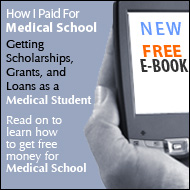Tips on Getting a Medical Residency
 |
|
||
 |
 |
||
It is important that potential residents are at the top of "their game," considering that they are competing against the brightest students in the country. The first step is to locate an open residency in the desired medical field. Next, the applicant must write a personal statement which will be used to decide whether or not he or she will be granted an interview. After completing the interviews with potential residency programs, applicants must come to a decision concerning their choices for residencies that they would like to accept. Matching residencies with medical students is a rigorous process known as "the Match."
The United States Medical Licensing Examination (USMLE) is a meticulous three part exam that all medical doctors must complete to practice medicine in the United States. The first part of the exam is usually taken at the end of the second year of medical school. The second is not taken until the fourth year of Medical school, and the third part is taken after the first year of residency. A medical student's score on the USMLE is one of the factors used by residency programs to form an initial evaluation of each applicant's aptitude. Scoring higher on the exam can greatly improve your chances of obtaining a favorable residency.
Writing your personal statement
By this time medical school students have most likely written quite a few personal statements for scholarships and medical school applications. Keep in mind that this statement is directed to future employers and colleagues. These statements are typically only about one page long, and contain basic information concerning qualifications, personal background, academic history, interests, career goals, etc.
The interview
The interview has a tendency to be quite intimidating for most people, but with the proper preparation it can actually be a positive experience. Up to this point medical students have put in countless hours studying and working to pass tests and learn procedures. If equal diligence is exercised in preparation for the interview, it should not be too difficult. Do research beforehand about the particular residency that you are interviewing for. Be familiar with the history of the establishment as well as, the kind of treatments, etc. they offer.
By the time that the interested parties set up the interview, they have already reviewed the applicant's information, and they are interested to see who he or she really is. Make sure you know how to get to the place of the interview, and be punctual! During the interview, convey three general points about yourself: your personality, communication skills, and ability to work in a team. These three points are crucial in any interview, because they determined how you answer your questions and how you sell yourself. In the interview, the interviewers may ask for clarification on some points of your resume. For example: poor grades, retakes on the USMLE, education or employment gaps, etc. Be prepared to answer these questions, but do not give them any reasons NOT to hire you. Use statements that turn weaknesses into strengths, and make sure to highlight your achievements. Let them know why you would be a great contribution to their program. Come prepared with some questions of your own to ask the interviewers. To find many more tips on how to ace your interview, please visit Medical Residency Interview provided by ResidencyandFellowship.com at: http://www.residencyandfellowship.com/page6.html.
"The Match"
After the interview process is complete, both the applicants and the programs submit a list of acceptable placements rated according to preference. These lists are entered into the National Residency Matching Program which is an automated program that matches applicants with residencies based on the given criteria. This system obviously does not allow every student and every residency to receive their first choice, but it does facilitate the matching process. The lists must be submitted by February, and on the third Monday of March, the information is released as to whether or not the applicants were placed at all. The exact placement destinations are not released until the following Thursday. Meanwhile, unplaced applicants have to take move quickly to locate a residency will take them on.
For more information on obtaining a residency, go to these websites:
How to ace the Residency Interview - http://www.residencyandfellowship.com/page6.html
Potential Residency Interview Questions - http://www.residencyandfellowship.com/page7.html
|
||||||||||||||||||||
+ Consolidate Your Private Student Loans Now! (Save Thousands!!)
Tell A Friend
 |
|
The Healthcare Career Resources column is presented by HealthcareCrossing, America's leading job search site dedicated to getting jobs for healthcare professionals.
Save Money with a Private Student Loan Consolidation from Medical School Loans By Brooke Heath Even as a young child practicing medicine on your stuffed animals, you knew that you were destined to become a physician. But the road to obtaining your medical degree takes more than just the ability to mend the imaginary wounds of a teddy bear. + read more |


| CALCULATORS | |
| Stafford Loan Payment Calculator | |
| PLUS Loan Payment Calculator | |
| Loan Consolidation Payment Calculator | |




